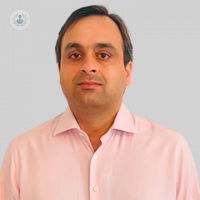Bronchiectasis: A patient-friendly overview
Written in association with:Bronchiectasis is a long-term lung condition where the airways (bronchi) become widened and damaged, leading to excess mucus production. This damage makes it harder for the lungs to clear mucus, increasing the risk of infections. Over time, this creates a cycle of infection and inflammation that worsens lung function. Revered consultant in respiratory medicine Dr Shalin Diwanji explains more about the condition.

How does bronchiectasis develop?
- Airway damage: The airways lose their ability to function properly.
- Mucus build-up: Damaged airways produce more mucus, which is harder to clear.
- Infections: Mucus build-up leads to bacterial infections, causing further airway damage.
- Inflammation: The infections cause inflammation, which worsens the condition.
Early diagnosis and treatment are important to prevent further damage.
What are the main causes of bronchiectasis?
Bronchiectasis can be caused by:
- Severe lung infections: Conditions like pneumonia, tuberculosis, or whooping cough.
- Chronic Obstructive Pulmonary Disease (COPD): Frequent flare-ups can damage the airways.
- Airway obstruction: Foreign objects or tumours can block and damage the airways.
- Acid reflux: Stomach acid entering the lungs can cause damage.
- Immune system problems: A weak immune system increases the risk of infections.
- Inherited conditions: Conditions like cystic fibrosis can lead to excess mucus and bronchiectasis.
- Ciliary defects: Problems with the tiny hairs in the airways that clear mucus.
- Allergic reactions: Allergies, especially to fungi, can lead to bronchiectasis.
Symptoms
Common symptoms include:
- Persistent cough with mucus (phlegm).
- Frequent chest infections.
- Breathlessness.
- Fatigue and wheezing.
- Occasionally coughing up blood.
Symptoms can vary from mild to severe depending on the extent of lung damage.
Diagnosis
Bronchiectasis can be difficult to diagnose because its symptoms are similar to other lung conditions like COPD. Doctors may use chest X-rays, sputum samples, and a high-resolution CT scan to confirm the diagnosis.
Treatment and management
Although there is no cure for bronchiectasis, treatment focuses on managing symptoms and preventing further damage. Key strategies include:
- Antibiotics to treat infections.
- Airway clearance techniques like breathing exercises to help remove mucus.
- Pulmonary rehabilitation to improve physical fitness and quality of life.
- Inhalers may help with breathlessness, especially if there is coexisting asthma or COPD.
- In rare cases, surgery may be an option if there is localized lung damage that other treatments can’t control.
With early and proper treatment, many people with bronchiectasis can maintain a good quality of life.
Preventing infections and staying healthy
- Vaccinations: Get regular flu and pneumococcal vaccines to prevent lung infections.
- Monitor symptoms: Be aware of early signs of infection, such as increased coughing or discolored mucus, and seek prompt treatment.
- Lifestyle changes: Stop smoking, eat a healthy diet, stay hydrated, and exercise regularly to improve overall health and respiratory function.
- Infection prevention: Practice good hand hygiene, avoid contact with sick individuals, and discuss the potential use of preventative (prophylactic) antibiotics if infections are frequent.
Airway clearance and pollution avoidance
- Daily airway clearance: Use techniques like breathing exercises or devices recommended by your respiratory physiotherapist to clear mucus from your lungs.
- Avoid air pollution: Minimise exposure to pollutants such as smoke and traffic fumes by avoiding busy roads, industrial areas, and staying indoors during high pollution times.
Self-Care and symptom management
- Regular follow-ups: Have annual check-ups with your doctor to monitor your condition and adjust treatments as needed.
- Physical activity: Regular exercise can help clear mucus, improve lung function, and maintain your overall health.
- Smoking cessation: Quit smoking to prevent further lung damage.
- Healthy diet and hydration: Eat a balanced diet and drink plenty of fluids to keep mucus thin and easier to clear.
Coping with daily challenges
- Cough Management: Persistent coughing can be frustrating, but clearing your airways before social interactions and managing your cough can help reduce embarrassment.
- Breathlessness: Use techniques like slow breathing, “blow as you go,” and paced breathing to manage breathlessness during activities.
Addressing other concerns
- Urinary Incontinence: If coughing causes urine leakage, try weight management, avoid caffeine and alcohol, and practice pelvic-floor exercises.
- Sex and intimacy: Bronchiectasis shouldn’t impact your sex life. Plan ahead by clearing your airways before intimate moments, and communicate with your partner.
Working, travelling, and staying social
- Work adjustments: If bronchiectasis affects your ability to work, consult your GP and employer for necessary adjustments.
- Travelling: With proper planning, you can still travel. Ensure vaccinations are up to date, carry medications, and stay mobile during flights.
- Social contact: Stay connected with friends and family, but avoid contact with people who are sick and maintain good hygiene practices.
By following these strategies, you can manage bronchiectasis effectively and maintain a high quality of life.
To book an appointment with Dr Diwanji, simply visit his Top Doctors profile today.


